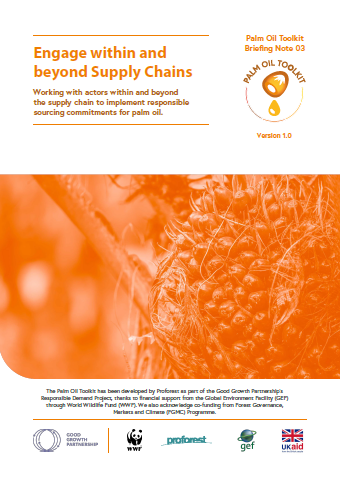Element 3: Engage within and beyond Supply Chains
Suppliers engagement is a key of success in responsible sourcing especially when most downstream companies do not buy directly from producers and buy from intermediaries in the supply chain, such as mills, traders, refiners, aggregators or manufacturers. Therefore, suppliers need to be part of the solution in achieving responsibly sourced palm oil, with their own commitments and implementation activities to cascade environmental and social requirements (on oil palm production) up the supply chain. The main objective for supplier engagement is to ensure that all direct suppliers are committed to responsibly sourcing palm oil and are implementing the ACRES approach or similar approaches in their own operations and supply chain.
This element aims to:
Within supply chains, companies need to deliver compliant volumes and engage suppliers.
Beyond supply chains, companies need to engage in the places they buy from and work across the sector.
Collaborating with other actors is essential to address complex issues that require action from multiple stakeholders.
1. WORKING WITHIN SUPPLY CHAINS
Most companies begin the process of engaging suppliers by focusing on their own supply chain and starting with their direct suppliers to leverage existing business relationships. There are two main approaches for engaging within the supply chain – volumes and suppliers. The companies can use volumes as a starting point to ensure that the volumes they source are produced in line with their commitments. As a minimum, all companies should engage with all their Tier 1 suppliers to communicate their requirements on responsibly sourced palm oil and support suppliers in implementing responsible sourcing in their own operations and supply chain. Engaging suppliers is an ongoing process and the scope of engagement will evolve over time based on previous engagements and supplier performance.
There are four main points of contact a company will have with its suppliers when engaging on sustainability issues – pre-sourcing, during sourcing, address grievances and collaboration. Below are the methods for companies to engage effectively and meaningfully with their suppliers to create real change in suppliers’ behaviour and practices:
New suppliers
Have a supplier screening and onboarding process
Include supplier sustainability requirements such as No Deforestation, Peat and Exploitation commitments in contract clauses
Existing suppliers
Measure and assess suppliers’ performance against these sustainability requirements and identify gaps
Support supplier action plans and KPIs development as well as initiatives development with suppliers jointly. This includes targeted site visits to production areas by downstream supply chain actors after carrying out risk assessments and prioritising specific upstream suppliers
Support suppliers to gain more knowledge and improve their performance though training courses, workshops, or other capacity building tools
Develop incentive or collaboration programmes to support and encourage suppliers to implement NDPE requirements
2. WORKING BEYOND THE SUPPLY CHAIN
Many issues have complex underlying causes and can only be addressed through collaboration between different stakeholders, including supply chain companies. It is strongly recommended that companies should work beyond the supply chain through one or more of the following approaches:
Landscapes or jurisdictions – the places where the commodities are produced.
Sector – systemic issues that occur within the sector.
Broader multi-stakeholder initiatives – the global, regional, national places where standards and legislative frameworks are developed.
Companies can embark on pre-competitive collaborations with industry peers, especially those with overlapping supply chains and/or production regions. Priorities should be identified based on clear criteria including the company’s sourcing priorities, an analysis of risks and intervention pathways that explain why landscape interventions are appropriate.
3. NEXT STEPS
Engaging within and beyond the supply chain is crucial to delivering on NDPE commitments and it should be implemented as a long-term commitment to continuous engagement and integrated into companies’ policies and action plans. The companies should monitor the effectiveness of their actions and progress towards meeting commitments through verification and reporting on a public platform to ensure that the company’s progress is transparent.
More information is available in the briefing note below - BN03 Engage within and beyond supply chain



